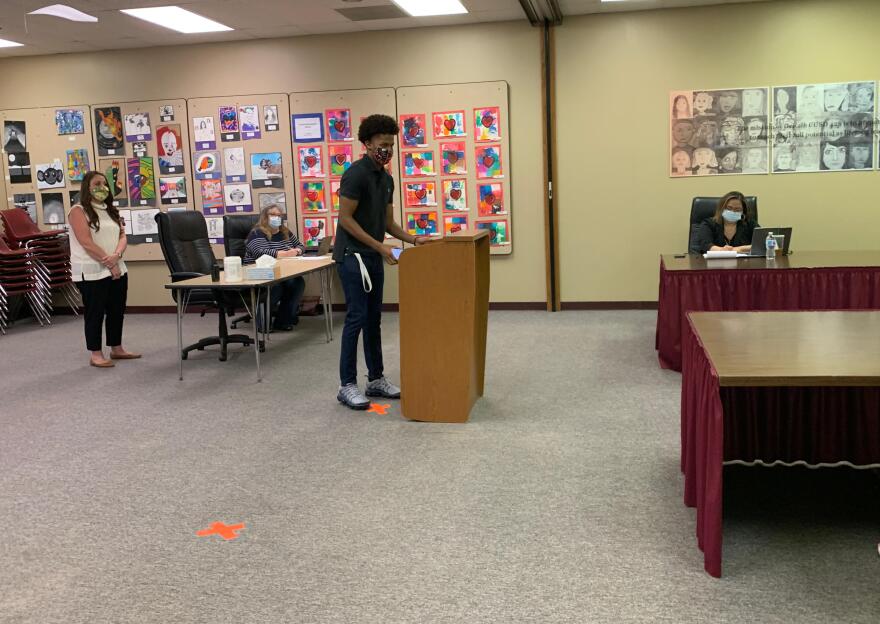It was Juneteenth 2020 and protests filled the streets in cities through northern Illinois. The DeKalb School Board hosted a special meeting to hear from the community about their experience with race and representation growing up in DeKalb schools.
A Black recent graduate named Lige Caples talked about the gaps in the Black history he learned.
“I’m 20 years old, I’ll be 21 in October, and as of maybe two days ago, I didn’t even know what Juneteenth was,” he said. “And I felt very bad because I’m one of the leaders for the protest that’s been going on and everything.”
David Seymour was sitting on the school board hearing Caples talk about an inadequate curriculum. Other students talked about there being a lack of students of color in AP courses and Black people in leadership positions -- persistent problems across the nation.
Just two years ago, Seymour himself became the first Black man ever elected to the DeKalb School Board. The board serves an over 20% Black student population.
Seymour says events where the community comes to share their story need to happen much more, and they need to be proactive, not just reactive to tragedies.
“[We should] Create spaces for folks to come and share their views, or even have workshops or speakers to be able to talk to issues and situations,” said Seymour.
The pandemic’s made that difficult. But, he says, the district has taken steps to alleviate some of the issues students like Caples discussed.
Rheon Gibson is one of the few Black school leaders in DeKalb. He’s the principal at Littlejohn Elementary School.
“If I wasn't on the social justice committee, I would probably see a black male once every three to four months, during the institute days,” he said. “And, you know, sometimes you can feel like you're on an island.”
He says projects like Equal Opportunity Schools have helped close race disparities in AP courses.
“Right now, they're in their third year of the initiative, and they've seen a nice amount of growth with Blacks, Hispanic, and students in low socioeconomic status as well,” said Gibson.
DeKalb’s Diversity Plan has also been instrumental in forging a new direction for the district. Their new superintendent, Minerva Garcia-Sanchez, told WNIJ it was a core reason she took the job.
Maurice McDavid, a principal in West Chicago, helped craft the Diversity Plan when he taught in DeKalb. He was also part of the team that wrote Illinois’ statewide Culturally Responsive Teaching Standards.
The standards have been in the works for years but were unveiled earlier this year. Some Republican lawmakers criticized them. McDavid wasn’t surprised.
Some say the state should focus on improving math standards instead. He says most of the complaints he heard were about Critical Race Theory.
“Which by the way is not even a huge part of these standards,” he said. “But all of this idea of anti-critical race: everybody has a race theory. When you start critiquing the mainstream theory about race, that's when people get upset.”
McDavid says the standards aren’t meant to turn students into an armada of leftist activists but to give teachers the tools to get to know their students -- and their cultural experience -- better.
“If I'm going to be a culturally responsive teacher teaching in DeKalb County, which is still over 80%, farmland, part of my culturally responsive teaching is going to engage agriculture,” he said.
The standards don’t apply to K-12 curricula, only teacher preparation programs. Gibson says DeKalb offers professional development on the standards if teachers want it.
Illinois State Senator Karina Villa says she grew up dealing with cultural miscommunications with white teachers. She co-sponsored the wide-ranging Education & Workforce Equity Act introduced by the Legislative Black Caucus amid summer 2020 protests calling for racial justice.
Villa says students had invited her on stage to speak at one of those rallies. The former school social worker says the energy of those students pushed her to work on the legislation.
“It was the youth voice that came out and said, ‘We want something different, we want something different for ourselves,’” said Villa.
Part of that plan is expanding minority teaching scholarships -- to aid in the teacher shortage, as well as increase diversity.
For Rheon Gibson in DeKalb, diversifying staff is a crucial issue.
“I noticed a trend. There was an overwhelming amount of referrals for African Americans and Hispanic males particularly. But all the referrals for those students were not physical altercations, not really violence -- it was subjective things,” he said. “So, things that can easily be misunderstood if I don't understand the culture. For instance, disrespect: tone of voice, things of that nature that just differs when you have a different culture.”
He's seen the issue play out with his own son. Gibson says in Kindergarten, his child had a Black teacher and had zero office referrals. The next year, with a white teacher, that jumped up to 30.
The litany of provisions in the act includes the formation of a Whole Child Task Force to look into trauma-informed support for students coming out of the pandemic. It also has policies to expand access to AP courses, reform developmental education and broadens Black history curriculum that the former DeKalb student mentioned last summer. It also tweaks the Aim High grant program to lower the amount of matching funds that universities with higher percentages of Pell Grant eligible students need to contribute.
“This is going to really help more students at less wealthy colleges, like Chicago State University, qualify for Aim High scholarships,” she said.
But, Villa says, if the state doesn’t fully fund education this year – and beyond – it will be much more difficult for efforts to make schools more equitable to come to fruition.


